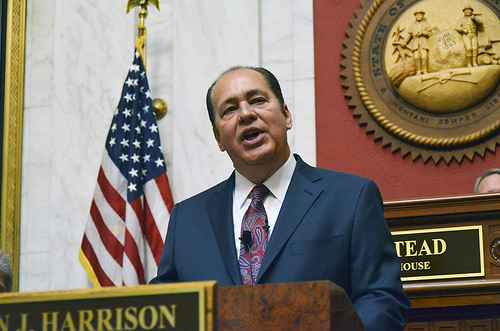
In his sixth and final State of the State address Jan. 13, Gov. Earl Ray Tomblin (D-W.Va.) proposed tax increases as a solution to a $350 million budget shortfall.
But before mentioning the 2017 budget, he touts all of his tax-friendly accomplishments:
On tax cuts:
“We’ve enacted gradual reductions in our business and consumer taxes, and since I took office, we’ve saved employers and West Virginians more than $225 million.”
On state rankings:
“We rank higher than each of our neighboring states in this year’s Business Tax Climate Index. Companies are noticing these changes, and they are paying off in big ways in regions across the state.”
On the budget:
“In spite of those challenges, we are paying not only our current bills, but keeping every financial commitment of the past, paying down our debts in workers’ compensation, teachers’ retirement and public employees’ retirement. And we’ve done that without a single tax increase, while reducing tax burdens on West Virginia families and those doing business here by hundreds of millions of dollars.”
West Virginians may see at least one more tax cut under Tomblin’s plan to pay off workers’ compensation debt.
He noted:
“By accelerating this final payment, we can remove additional severance taxes on our coal and natural gas industries, providing much-needed relief to help them invest in our state and employ West Virginia workers.”
But that does not cancel out a new tax and a tax increase. He proposes:
“As we work to find new ways to ensure our tax base is both stable and more diverse, we must also seriously consider new revenue opportunities. Tonight, I am introducing legislation to increase our state’s tobacco tax by 45 cents a pack to a total of one dollar.”
This tax increase would generate $71.5 million in revenue annually.
He also suggested eliminating the sales tax exemption for cell phone and phone line usage, which could rake in $60 million annually:
“Once adopted, this legislation will place the same 6 percent sales tax on cell phone and phone line usage – putting us in step with what is done in the vast majority of other states.”
He tries to justify his way of compensating for the state’s overspending problem:
“With these proposed changes – and despite low severance tax projections – the 2017 budget I present to you tonight uses no money, no money from our Rainy Day Fund and does not include any across-the-board budget cuts beyond those already in place. In spite of the tight budget years of the past, our new six-year budget forecast shows surpluses of nearly $7 million in 2019, $89 million in 2020 and $118 million in 2021.”
But Republican House leaders aren’t as willing to increase taxes.
State House Speaker Tim Armstead said House members support spending cuts, not raising taxes. House Majority Leader Daryl Cowles said that lawmakers from border counties could be hesitant, as consumers could go to Virginia. Virginia’s 30 cents-per-pack tax would drastically differ from West Virginia’s proposed $1.
“Virginia’s awful close to home,” said Cowles. “There’s not much of an appetite to raise taxes. We should streamline government.”
West Virginia is ranked 21 in the Tax’s Foundation’s 2016 State Business Tax Climate Index, which was released in November.

